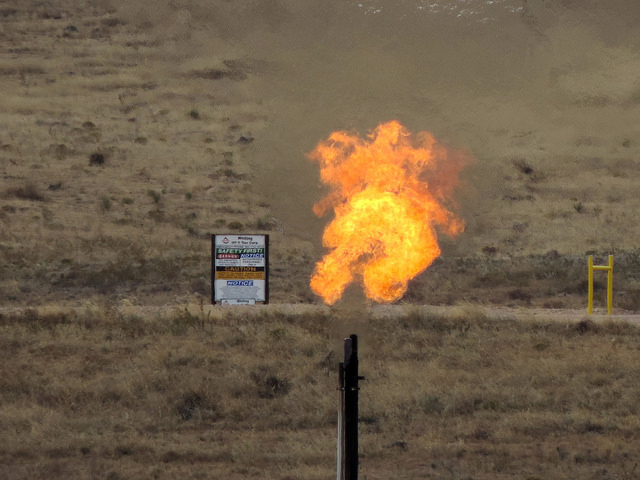
The House voted to roll back rules on methane flaring this week. (credit: WildEarth Guardians)
Last week was a busy one for people watching the federal government’s rules on energy and the environment. With the opening of a new administration, the Republican-dominated Congress has been quick to kill regulations from the previous administration and enact new ones of its own. Below we take a glance at some of the most noteworthy actions taken by the executive branch and Congress this week.
1. Rolling back the stream protection rule: Congress wasted no time wielding a previously little-used rule called the Congressional Review Act, which allows the legislative branch to repeal rules and regulations passed in recent months. According to the Federation of American Scientists (via Vox), the 115th Congress can now overturn rules submitted on or after June 13, 2016 in an expedited reversal process. The stream protection rule, finalized in late December, is among those rules that found itself on the chopping block. The rule required coal companies that had finished mining in an area to restore the the land to conditions that existed before the mining began, with an emphasis on streams and waterways. Opponents of the rule claimed that the 1997 Surface Mining Control and Reclamation Act, which only forbids “material damage to the environment to the extent that it is technologically and economically feasible,” is sufficient to protect the environment around coal mining operations and that the newer stream protection rule unduly burdens mining companies. Both the House and the Senate voted to roll back the stream protection rule this week. Now the resolution to undo it officially awaits the signature of President Trump.
2. The resource-extraction rule: This rule also saw the blunt end of the Congressional Review Act this week. The rule got its start in 2010 as the Cardin-Lugar Amendment, a bipartisan amendment to the Dodd-Frank Act requiring oil, gas, and mining companies to reveal what they paid to foreign governments. Those companies sued over the rule, and a federal judge tossed out the first version of it in 2013. The Obama Administration started the rule-making process again, but the Securities and Exchange Commission (SEC) only enacted it in June 2016, leaving it vulnerable to the Congressional Review Act today. Extraction companies said the rule put them at a competitive disadvantage, and Rex Tillerson, the former Exxon-Mobile CEO who was sworn in as Secretary of State this week, lobbied hard against the rule in 2010. This leads some to question whether Tillerson’s business connections in foreign countries jeopardizes his ability to work as Secretary of State. However, the resolution to remove this rule was approved by both the House and the Senate this week, so it also awaits Trump’s signature.

